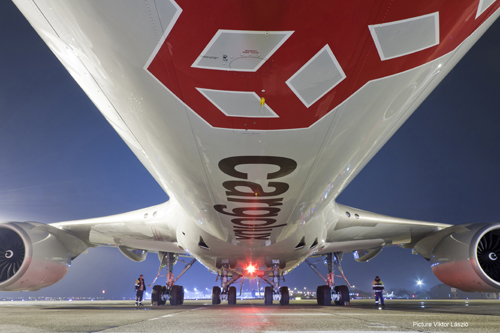No products in the cart.
Cargolux says CWA deal hammered out with unions
 Talks continued about a day after the previous collective work agreement (CWA) had already expired on Monday night, but by the early evening of Dec. 1, all-cargo carrier Cargolux announced in a press release that a “major breakthrough” had been reached between Cargolux and two of the unions representing its crews – OGBL and LCGB – possibly ending a 15-month-long dispute that appeared to be headed toward a strike earlier in the day.
Talks continued about a day after the previous collective work agreement (CWA) had already expired on Monday night, but by the early evening of Dec. 1, all-cargo carrier Cargolux announced in a press release that a “major breakthrough” had been reached between Cargolux and two of the unions representing its crews – OGBL and LCGB – possibly ending a 15-month-long dispute that appeared to be headed toward a strike earlier in the day.
Details were not immediately available about the terms that were reportedly agreed upon, but Cargolux said a new CWA had been formed for the airline’s staff, which “clears the road to growth and financial sustainability,” according to the statement.
“The last intensive rounds of negotiations focused on crew related items,” said the Luxembourg-based airfreight carrier. “The perseverance of the negotiating teams yielded a principle agreement with both unions on the new CWA terms that sends a strong signal on the company’s commitment to job security for our staff and an increased support towards maintaining the competitiveness of Luxembourg as the prime air freight hub in Europe.”
As of late Tuesday, no official word had come from OGBL or LCGB to confirm the deal or comment on the terms discussed. According to some press reports in the local French- and German-language press on Monday evening, the ground crews had reportedly agreed to the carrier’s terms, but the pilots were still unhappy with a few more details.
The alleged agreement came after an extended period of deadlock and a flurry of negotiating tactics in the last week of November. Cargolux began the marathon 12-hour meeting with the unions on Monday, Nov. 30, with an offer to hire 120 new employees in 2016, including 100 pilots, to keep pace with its rapid expansion and take pressure off flight crews, who had complained about not getting enough rest in between flight. Cargolux also said it would replace its two 747-400BCF freighters with three nose-loading 747-400Fs, thus expanding its fleet from 25 to 26 aircraft by the third quarter of 2016.
The unions, however, appeared unmoved by the gesture, saying on Monday in the that the extra hires and new planes did not adequately address their main concern, which was the use of Cargolux Italia pilots flying out of the Luxembourg hub – a practice the unions referred to as “social dumping.”
Dirk Becker, the general secretary of the Luxembourg Pilots Association, said on Monday that he was “not optimistic” about the outcome of Monday’s CWA negotiations. He added that 100 new pilots was inadequate in light of the air crew hiring freeze that had been imposed by Cargolux in October 2014, which resulted in the loss of roughly 50 union pilots due to retirement, medical issues or change of employment.
Last week, both unions – which represent about 1,500 workers at Cargolux and most of its 450 pilots – had submitted cost-cutting proposals that they said would shave about US$10 million in Cargolux’s expenses each year, most of which would be “shouldered by the pilot community.” The offer, however, failed to change the CWA stalemate.















